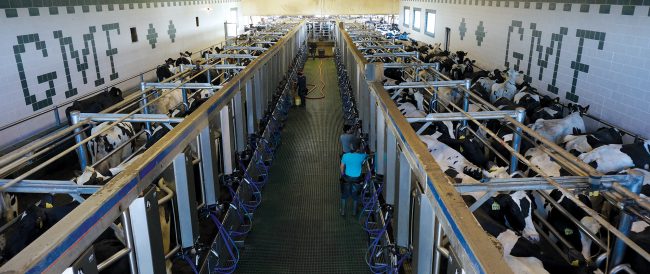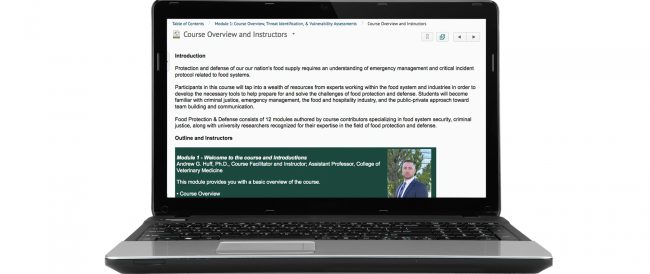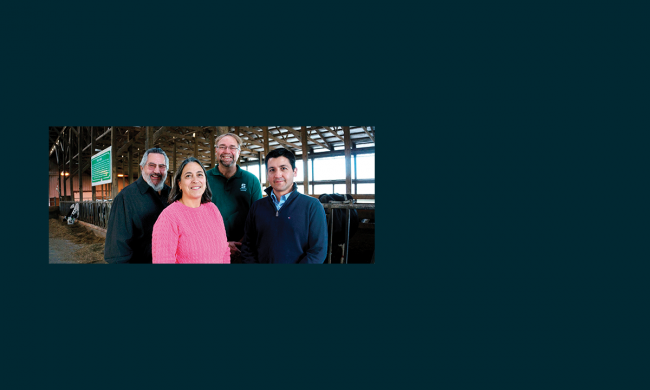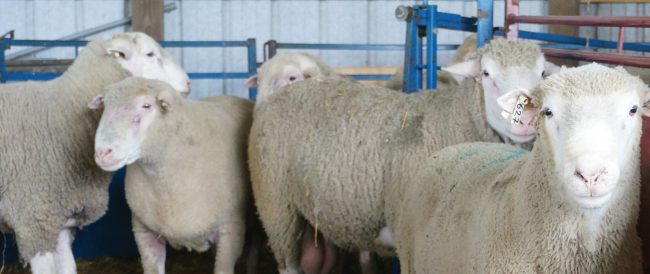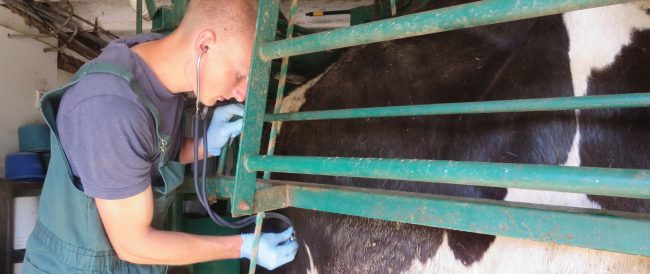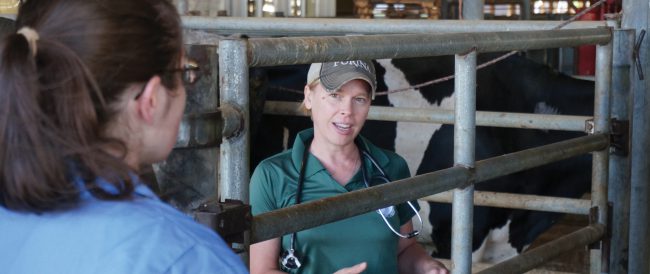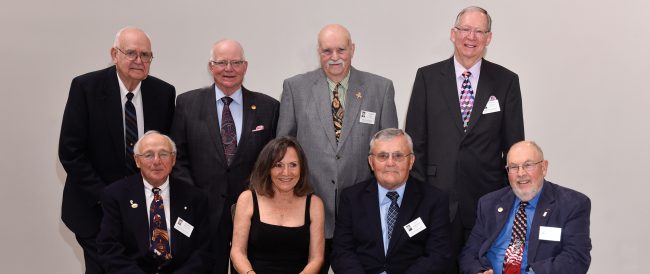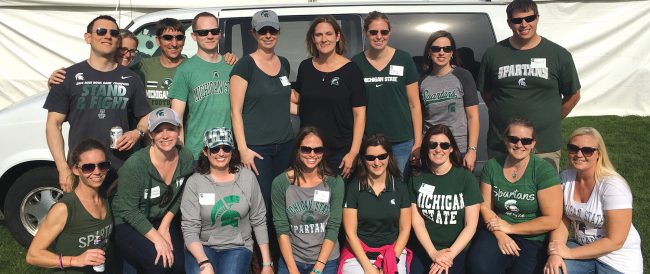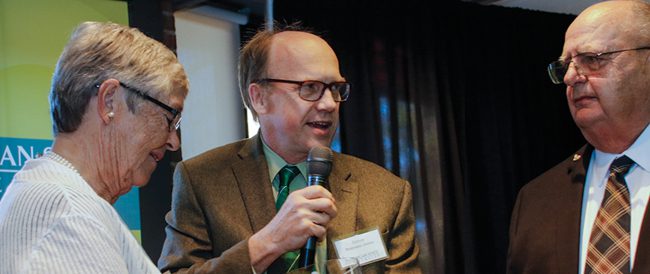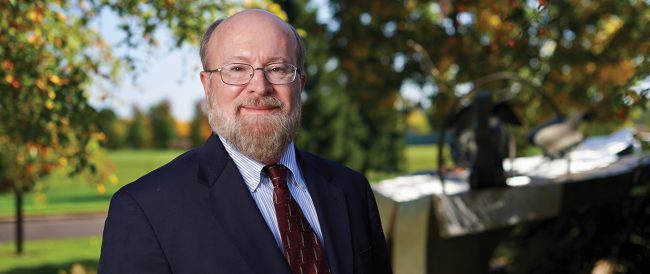 Read More
Read More
12 years of adding value to the student experience.
By Jamie DePolo
Created to fill the twin needs of offering well-paying, real-world experiences to veterinary students and attracting more students to work in the food animal industry, the Food Systems Fellowship Program (FSF) gives students the opportunity to work for 10 weeks in a non-clinical setting in the food industry.
“Since the program started in 2006, we’ve had 24 different industry partners provide summer jobs for our students,” says Dan Grooms, chair for the Department of Large Animal Clinical Sciences, who founded and continues to coordinate the program. “Some of the initial partners are still part of the program, and we’ve forged both national and international connections for our students.”
Students have to apply for the program and prioritize the opportunities. The College oversees the application process and forwards the information to the partners, who make the final selections. The costs of the students’ summer salaries are split between the partner and the College. Typically, 30 to 40 students apply for the approximately 10 positions, so the program is extremely competitive.
“I wanted to participate in the program because I plan to practice production animal medicine upon graduation, and this was a great chance to experience different sides of veterinary medicine that most students never get exposed to,” says Colleen Potter, class of 2020, who was part of the 2017 Food Systems Fellowship Program. “I worked for Merck Animal Health, so I was able to experience different production systems from the pharmaceutical industry perspective. I had the awesome experience of traveling around the country, and especially traveling into the heart of beef country, an industry I had had very little exposure to before. I learned a ton about the economic side of food producing industries and the role of tech service veterinarians from Merck.”
“One key aspect I learned through working at Neogen was the role of veterinarians in an industry setting,” says Andrew Brummitt, class of 2019, who worked in the Neogen Corporation Pathogen Detection Research and Development Laboratory during the 2017 program. “Many DVMs are portrayed as companion animal veterinarians. However, while working at Neogen, I learned there are many different possible career paths for veterinarians. Veterinary medicine provides a very broad education that can open many different job opportunities.”
“After spending a summer working through the Program, I realized that I grew not only on a professional level, but also on a personal level,” says Lora Gurley, class of 2018, who was part of the 2015 program. “I worked for a company that sent me to a different state every week, and they had me work with some of the largest feedlots, dairies, and calf ranches in North America. As a result, I was afforded the incredible opportunity of working with a wide variety of clients. I improved my communication skills, gained an appreciation for and understanding of the cattle industry, and drastically enhanced many of my clinical skills. I also had the opportunity to practice speaking Spanish with ranch hands, which has proven to be invaluable as I continue to work in production medicine. The Food Systems Fellowship position laid the groundwork for a vast networking web, one that I still use routinely.”
“The Food Systems Fellowship Program helps students to improve communication skills, network with current industry professionals, practice clinical skills, and much more.”
— Lora Gurley
The Food Systems Fellowship Program partners are just as enthusiastic about the program.
“NorthStar Cooperative and Antel BioSystems serve the food animal production industry,” says Todd Byrem, director of Antel BioSystems. “So, we strongly consider any opportunity to grow, support, and promote this industry. The Food Systems Fellowship Program is designed to introduce and attract talented veterinary students to various facets of the food animal industry, and through NorthStar and Antel BioSystems, we enjoy teaching students our role in the dairy and beef industries.
“In return, we get very cost-effective access to talented minds and eager souls to help us in our research and development program,” he continues. “The quality of the applicants grows each year and we are able to put their experiences to valuable use in both field and laboratory research. Compared to other new employees, the training requirements are often minimal and FSF students are able to hit the ground running on some very intricate and relevant projects.”
“The benefits of participating in the Food Systems Fellowship are twofold,” says James Averill, state veterinarian and director of the Animal Industry Division of the Michigan Department of Agriculture and Rural Development. “One, we are able to show a veterinary student the value, role, and responsibilities of working in regulatory medicine so they will advocate on our behalf as a veterinarian. Second, the veterinary student is an additional resource to help tackle key animal health issues and policies we may be addressing. I would strongly encourage a company or organization be involved, as a young and intelligent veterinary student who is willing to tackle the real world always brightens your day. The students can be a breath of fresh air, share generational perspective, and will become a lifelong friend and colleague.”

To give the students an opportunity to talk about both the rewards and challenges of their positions, Food Systems Fellowship students meet monthly as a group, with most attending remotely. They also work together on a community-service project, creating an exhibit for the annual Great Dairy Adventure, a free event each summer at the MSU Pavilion that gives attendees an inside look at Michigan’s dairy industry.
Students who have participated in the program also have the opportunity to apply for a special scholarship.
“Merck Animal Health, one of our initial partners, provides three $5,000 scholarships each year to alumni of the Food Systems Fellowship Program,” Grooms explains. “It’s only open to those students, so it’s another very nice perk of the program.”
“The Food Systems Fellowship Program helps students to improve communication skills, network with current industry professionals, practice clinical skills, and much more,” says Gurley. “The program also provides a healthy compensation package that is commensurate with the work [a veterinarian] will be doing. Lastly, since all participants of the program are eligible to apply for the FSF Merck Foundation scholarship, this is another opportunity to offset the cost of veterinary school.”
“I would definitely recommend this program to students who are interested in production animal medicine,” adds Potter. “They will experience a side of food animal production systems that most veterinary students are never exposed to. It is also a great way to make connections and learn about different pathways you can take after veterinary school. I met so many people this summer who all taught me about being the best veterinarian and person I can be, and how to succeed in my career later on.”



